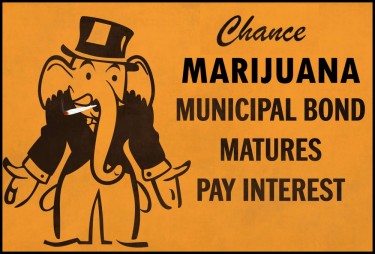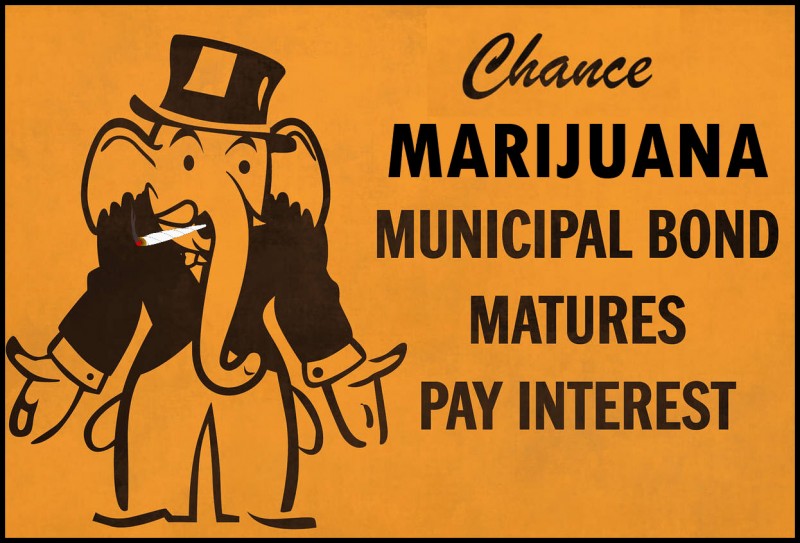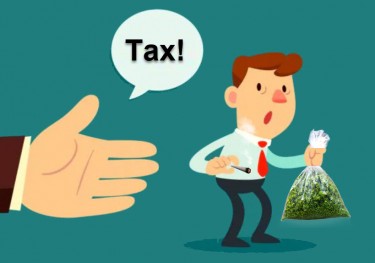Cannabis Municipal Bonds Could Be the Future

With the cannabis discourse, governments, investors, enthusiasts are constantly seeking the next "Big" thing. What can be the future of cannabis? It is cannabis municipal bonds (CMBs), and here's why.
The impact of the COVID-19 pandemic on states and the CMB discourse
The COVID-19 pandemic affected America immensely, with cases rising daily and negatively affecting the public sectors globally. There is such a momentous economic meltdown, and the "Stay home" orders didn't help the situation.
Experts agree that the impact of the pandemic will remain for several months to a year because of the sales and income tax decline. So right now, government agencies are thinking about ways to fasten their recovery effort; they are all looking for answers, and CMBs offer great potentials.
All over America, economic growth is connected to the opening and maturing of cannabis markets. Since the U.S legal sales have an estimated $24 billion reach by 2022, the United States economy can maximize this reach within the next 4-6 years.
This massive cannabis potential for the economy can also positively contribute to the economy if the illegal (black) market is absorbed into the regulated one. But how can Cannabis Municipal Bonds work? Why should government agencies consider them, and how can they make up for lost revenue during the pandemic?
Reasons why CMBs are the future:
-
Comparable initiatives are already in place
Firstly, special tax bonds backed by taxes already exist on some activities or assets. For instance, many states have special sales taxes on alcohol, gaming, and even tobacco called "Sin taxes." The revenue generated from these substances can be utilized to finance future investment initiatives like boosting infrastructure.
A good example is the state of Iowa that allocates $55 million annually from gaming taxes to service their debt on revenue bonds. These bonds are used to finance community revitalization projects, bridge improvements, and mitigate disasters such as floods.
Since the initiatives are in place and working, it gives credence that Cannabis Municipal Bonds can work and in the future.
-
The Colorado cannabis-funded BEST program is successful.
Another reason for such faith in CMBs is the fact that the state of Colorado has a flagship cannabis-funded social program named "Best." BEST here means, Building Excellent Schools Today, and it focuses on assisting public schools with their myriad of capital construction needs.
This program aims to offer Colorado students first-class, premium, and high-quality school facilities, which will alleviate safety and health concerns in the state.
BEST has four revenue sources: Cannabis Excise Taxes which contributes 90% of yearly revenues of $40 million. The remaining amount goes to public schools' permanent funds.
In 2017-2018, $90.3 million in cannabis revenue was given to the Colorado Department of Education. This is a massive increase from the 2016-2017 period, which was $48.5 million in cannabis tax funds. This program is a viable example of how governments in legal adult-use states can utilize and invest cannabis tax revenue into their municipalities.
Colorado is an apt example of how states and municipal governments can tap into the cannabis revenue stream to fund ambitious projects.
-
Banking should not be a challenge.
The cannabis industry faces many challenges with the banking sector as most of the debt underwriters do not want to do anything with cannabis until it is federally legal.
Although policy alterations are crucial for the expansion and growth of the cannabis industry, they don't prevent the utilization of Cannabis-based Municipal Bonds.
States and local governments access cannabis tax revenues and blend the funds with general funds from other revenue sources. The funds are then placed at the Federal Reserve System. Capital gotten from Cannabis Municipal Bonds wouldn't be different than other tax revenues, so that it wouldn't require any particular regulation.
But convincing the banks and the underwriters to offer Cannabis Municipal Bonds to the market will be a different challenge. This challenge is enormous because of the problematic stance financial institutions take towards the cannabis industry.
Potential Cannabis Municipal Bond states
Experts observe that the demand for CMBs will grow as cities and states grapple with the economic impact of the pandemic. Seven states could identify the potentials CMBs offer, and they also hold the promise of legalizing cannabis for adult use.
The states include Vermont, New York, Connecticut, Montana, New Jersey, Missouri, and Arizona. Although it is reported that only Missouri and Arizona will support CMBs, the state of Vermont doesn't have the tax revenue to make it valuable.
Cannabis revenues are 'Steadier" than that of tobacco, casino, or alcohol tax revenues (people do love their weed). Since the idea of Cannabis Municipal Bonds is still a novel concept, states might still be hesitant to issue it. But we are having the conversation already, which means it holds great promise, and soon enough, financial institutions will start to ease their opposition to the cannabis industry.
In truth, CMBs may be the next step towards legalizing cannabis in states where it is not already legal. Numbers don't lie, and the increasing revenue cannabis brings to a state cannot be ignored.
Bottom Line
Cannabis entrepreneurs have a unique window opportunity right now as they are a part of the solutions for economic revival post the COVID-19 pandemic. Through the CMBs, as a cannabis entrepreneur, you can tap into this opportunity.
Visit your local and state representatives as you consider using Cannabis Municipal Bonds to pay for local initiatives, which may lose funding because of the negative impact of COVID on tax returns.
CMBs will solidify the cannabis industry's place in society as a viable and essential part that is deserving of fair access to banking and standard tax regulations.
The demand for cannabis skyrocketed during the pandemic as it is reported that Americans purchased $18.3 billion worth of cannabis products within the last year. This figure is $7.6 billion more than the previous $10.7 billion of the prior year.
So cannabis revenue is rising, which means in states where it is legalized, they will consistently have access to the revenue it generates. The consistent revenue is crucial in helping municipalities execute projects, which is why Cannabis Municipal Bond is the future.
CANNABIS TAX REVENUE, READ MORE...
CANNABIS TAX REVENES - HOW MUCH CAN STATES REALLY MAKE OFF WEED?
OR..
SHOULD TAX REVENUE GO TO TOWNS THAT BAN MARIJUANA BUSINESSES?







